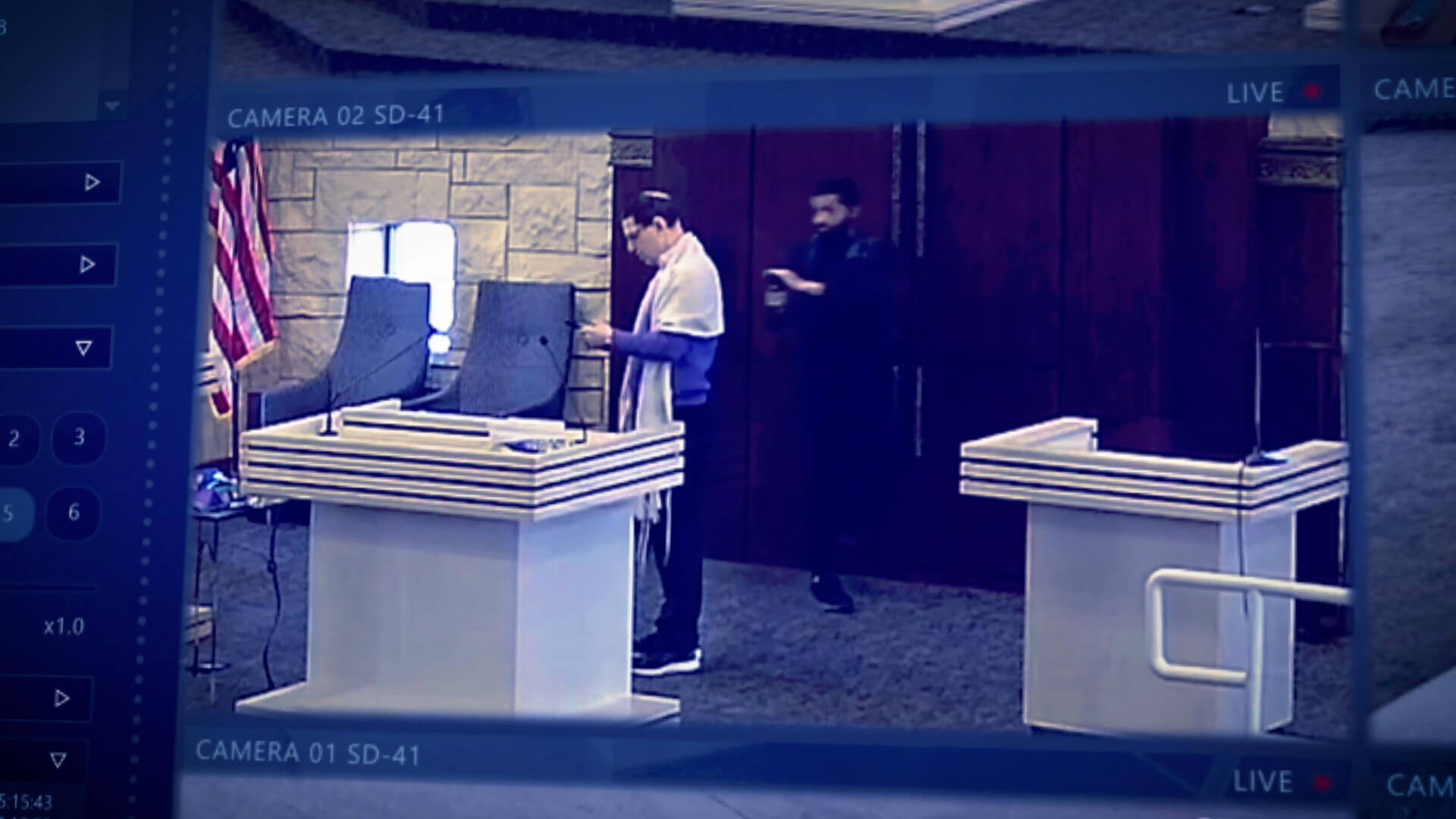With never-before-seen security cam footage, movie brings viewers inside tense hostage crisis at Texas synagogue
‘Colleyville’ is Israeli-American director Dani Menkin’s latest documentary to explore a slice of modern Jewish history

Malik Akram, left, holds a gun to Rabbi Charlie Cytron-Walker in a scene from the Colleyville documentary. Courtesy of Hey Jude Productions
One of the most surprising moments in the taut new documentary Colleyville — and one of the most illuminating — involves, of all things, a Pizza Hut.
About eight hours after a gun-toting Muslim extremist entered a Texas synagogue on a Shabbat morning in January 2022, and said he had a bomb in his backpack, the five hostages were famished.
“Do you want pepperoni with that?” the woman at Pizza Hut asked the hostages over the phone. They politely declined.
About a half-hour later, the pie was delivered and Jeff Cohen was eating a slice. “The pizza was good,” he recalled. “It was still hot, had plenty of cheese. It was kosher-style. For a hostage situation, yeah, we’ll take it.”
Cold weather, COVID-19 restrictions, and a synagogue in decline: Compound all of that together and it’s not surprising that only the rabbi and three congregants showed up at Beth Israel that January in Colleyville, a suburb 15 miles northeast of Fort Worth, Texas. The rest of the congregation was watching online via a Facebook Live stream.
The genial Rabbi Charlie Cytron-Walker welcomed a stranger to the building that morning, 44-year-old Malik Akram, and offered him some tea to warm up. It wasn’t until about halfway through services, around 10:30 a.m., that Akram revealed his true intentions.
“I love death more than you love life,” the gunman is heard telling the rabbi.
Congregants watched in horror online from their kitchen tables and living rooms. The stream to the public was eventually cut, any hopes of seeing what happened inside the sanctuary seemingly lost.
But the Facebook stream continued to record on a private server. Add to that hours of audio and video from 13 security cameras fanned out across the building and facing the parking lot outside where hundreds of law enforcement officials were stationed. It’s rare that we get such a close-up view of a hostage situation, but when Israeli-American director Dani Menkin finally got access to all this footage, he had a gold mine of never-before-seen material.
This tense play-by-play, with viewers becoming flies on the wall throughout the daylong hostage crisis, is a marked contrast to the 2022 HBO documentary about the shooting at Pittsburgh’s Tree of Life synagogue, where 11 Jews were murdered on a Shabbat morning. In that incident, the mass shooting took mere minutes, and so most of what you see in that film is interviews with survivors and relatives of the dead, as well as a look at how the community rebounded after the deadliest antisemitic attack in American history.
The message of the Tree of Life film is ultimately about resilience, but is also, of course, about deep tragedy. The Colleyville documentary, on the other hand, benefits from how events ultimately unfolded: After an 11-hour standoff, all the hostages escaped unharmed and Akram was shot and killed on the scene.
It doesn’t hurt that the Texas hostages were an eclectic cast of characters: a young rabbi, a hard-of-hearing old-timer, a Christian who was in the middle of converting to Judaism, and Jeff Cohen, who can be seen on the security camera leaning back in his chair in the sanctuary and eating that slice of pizza.
Menkin has a track record of injecting drama into documentaries that shine the spotlight on a small slice of modern Jewry. In Picture of His Life, Menkin tags along with Jewish photographer Amos Nachoum as he attempts to take a picture of the world’s largest carnivore. 39 Pounds of Love, about an Israeli who perseveres through a rare illness, was short-listed for an Oscar.
In perhaps his most well-known earlier work, On the Map, produced by Nancy Spielberg, Menkin recounts the Cinderella story of the 1977 Maccabi Tel Aviv basketball team and their victory over a team from Moscow to ultimately win the European Championship.
Like those films, Colleyville benefits from footage of the actual event. Add to that phone recordings made that day — from congregants, the attacker, and the FBI — plus appearances by President Biden and then-Israeli Prime Minister Naftali Bennett, and the film plays like an episode of 24, with multiple real-time views from inside the premises as the hostage crisis unfolded. Tense music and a literal clock ticking in the background provide the soundtrack for much of the film.
The result is nothing short of a high-octane thriller.
The documentary Colleyville is making its North American debut June 23 at the Los Angeles Jewish Film Festival. If your community would like to host a screening, visit heyjudeproductions.com.
A message from our CEO & publisher Rachel Fishman Feddersen
I hope you appreciated this article. Before you go, I’d like to ask you to please support the Forward’s award-winning, nonprofit journalism during this critical time.
We’ve set a goal to raise $260,000 by December 31. That’s an ambitious goal, but one that will give us the resources we need to invest in the high quality news, opinion, analysis and cultural coverage that isn’t available anywhere else.
If you feel inspired to make an impact, now is the time to give something back. Join us as a member at your most generous level.
— Rachel Fishman Feddersen, Publisher and CEO